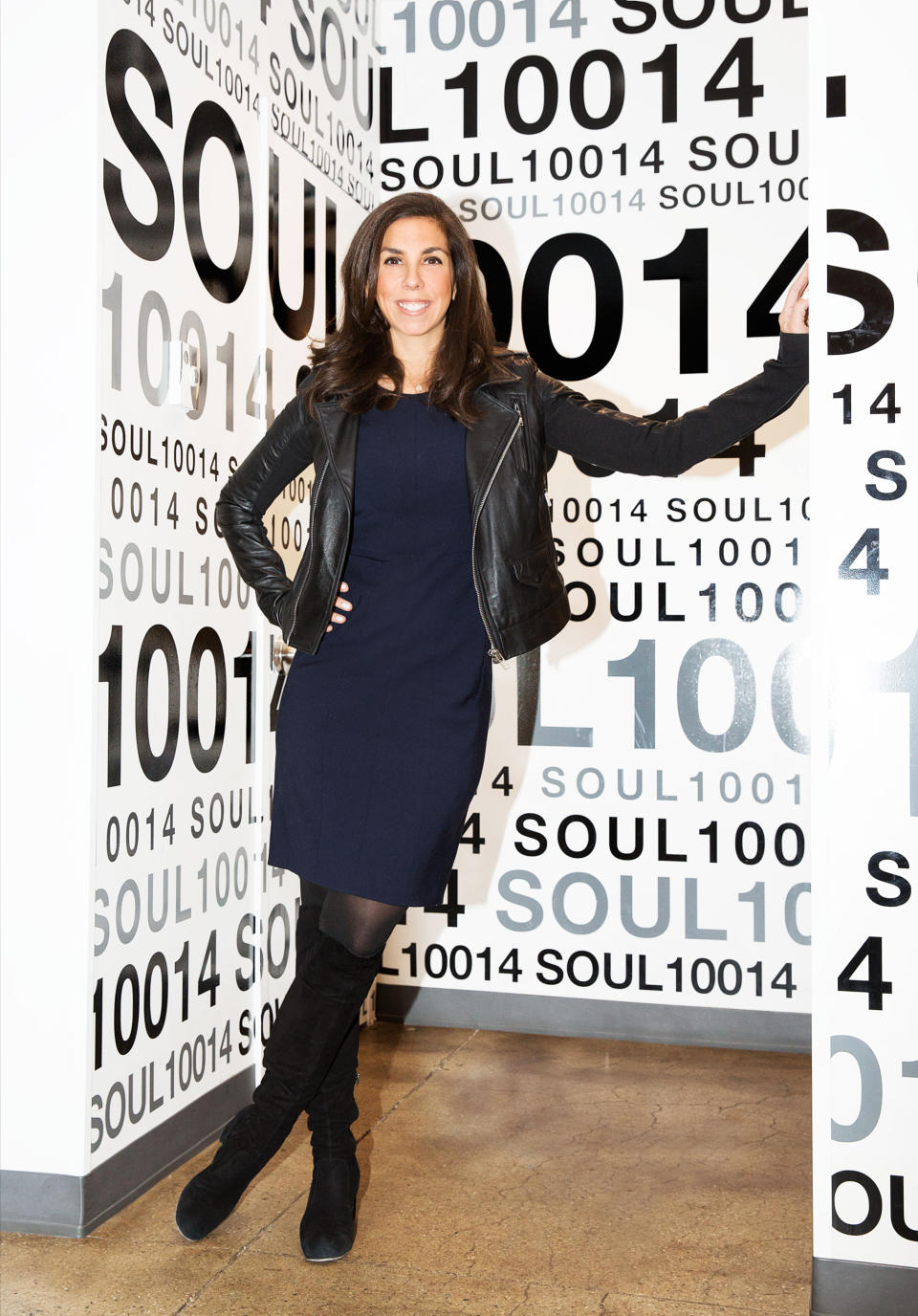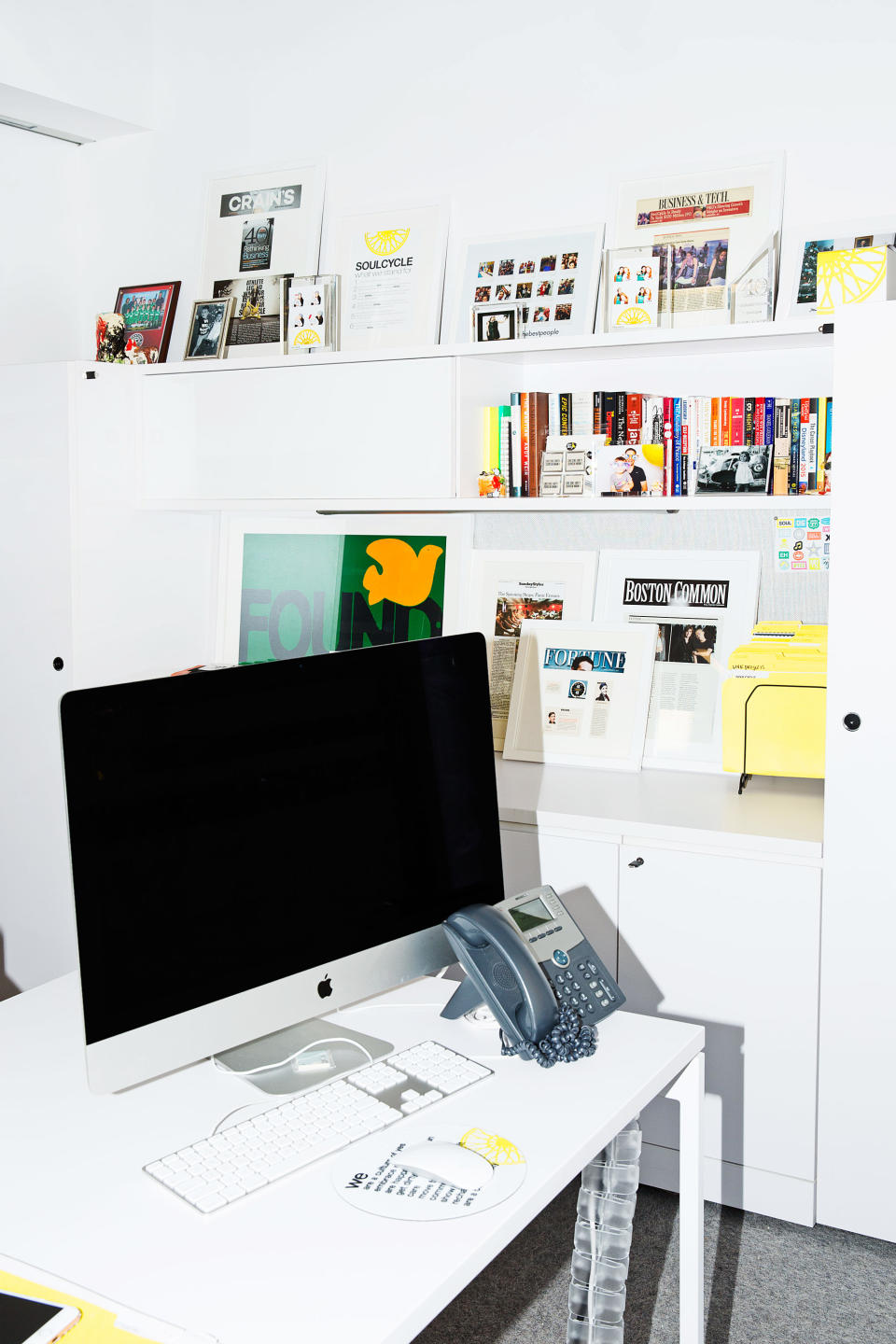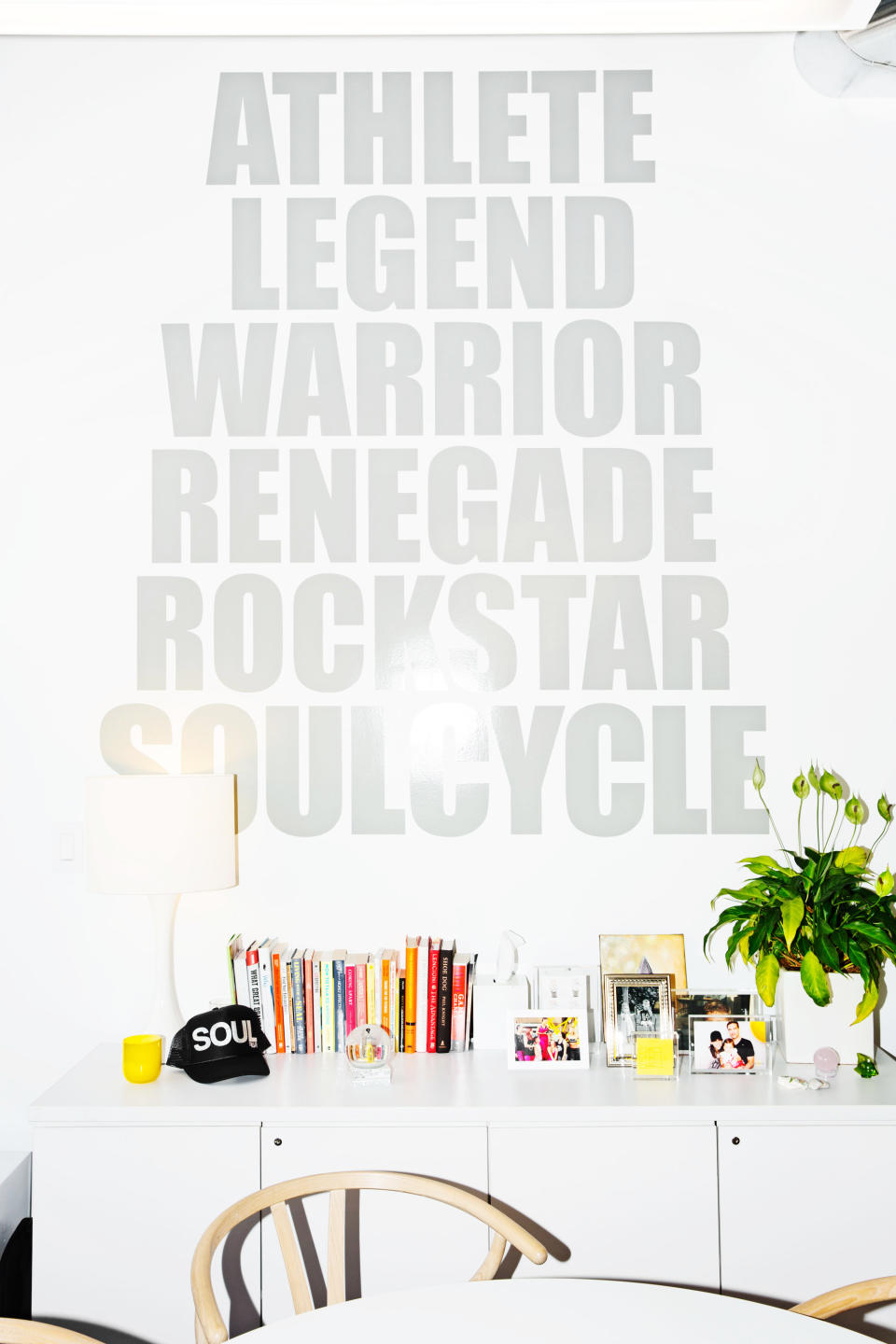Get That Life: How I Became the CEO of SoulCycle

Melanie Whelan, 39, was drawn to the hospitality industry at an early age, playing hotel with her sister and checking her into a pretend front desk as if she were a guest. Melanie is now the CEO of SoulCycle, the indoor cycling studio credited with creating an entire boutique fitness industry. She joined the company in June 2015, when there were just seven SoulCycle studios in the New York area. Today, there are 70 studios and another 10 to 15 studios set to open in 2017. She discusses how she turned her passion for hospitality, customer service, and fitness into an incredible career:
I played basketball and lacrosse at my all-girls high school in Baltimore, and although I wasn't the best athlete, I loved being part of a team - especially a winning team.
I applied to the engineering school at Brown University to become an architect, and majored in engineering and economics. Two years in, I decided that all the labs and science weren't for me, professionally. I wanted to do something more entrepreneurial like my dad, who ran a messenger business, then a transportation business, in Washington, D.C. I remember listening to him talk to customers when things went wrong. He'd say, “Tell me more, I understand, I'm so sorry.” He'd listen and build a relationship, and that approach stoked my interest in customer service and drew me towards the hospitality industry.
By the time Starwood Hotels came to campus to recruit students during the spring of my senior year, I super eager to get any job. After I met the person running the corporate development team, which helped with brand strategy and brand organization, I decided that working for a hotel company sounded like the most amazing job ever. I started as an analyst on that team in 1999.
My team's job was to figure out ways to extend the brand experience into things like timeshares, cruises, and golf club memberships, and developing partnerships to optimize the customer experience, which involved bringing interesting restaurateurs into hotel lobbies and partnering with brands like Reebok to bring some life and energy into hotel gyms. My role was to build financial models for these projects. It was nothing sexy, but it exposed me to many different pieces of the business.
After the attacks of September 11, Starwood's CEO Barry Sternlicht saw the resulting downturn in the travel market as an opportunity to acquire assets. At 25, I started working seven days a week on financial models to predict how acquisitions would affect the company's share prices. I loved it - I'm a hustler - but I was leaving my Manhattan apartment at 6 a.m. to commute an hour and a half to work in White Plains every day, and I wouldn't get home until 10 or 11 p.m.
Still, I truly wasn’t looking for a new job when my coworker mentioned an opportunity she heard about through her roommate: The Virgin Group, which is based in the U.K., was launching a corporate development team in New York City, and they were looking for an analyst. Because corporate development teams were rare at the time - there were investment bankers and consultants, but the idea of corporate development as a function was just starting to take hold - and corporate development analyst positions were even less common, it sounded like a once-in-a-lifetime opportunity. Plus, I thought the shorter commute would let me see my friends during the week for a change.
When I started at Virgin in June 2002, one of the company's biggest initiatives was to launch a U.S.-based airline, Virgin America. It was just three of us sitting in a loft space in SoHo. We started making phone calls, putting together project plans, and talking to bankers and lawyers and regulators and aircraft companies and uniform manufacturers. Four years later, we had a staff of 26 people and a plan to launch the airline at San Francisco International Airport in Burlingame, California.
I was so happy at Virgin, but I'd also kept in great touch with an interesting guy named Tyler Morse who I'd worked with as I was leaving Starwood - the then-CEO of Bliss spas, which was acquired by Starwood during my transition to Virgin.
One day, he met me at the Virgin offices and mentioned he'd just spoken to Harvey Spevak, the CEO of Equinox, who had told Tyler that Equinox was looking for a head of business development. I'd been a member there forever; when I was at Starwood, the one thing that kept me sane was going to Equinox on weekends for personal training, to use their spa, and for their shops.
Tyler connected us early in 2006, which led to six months of interviews with 10 different people. It was torture! Every time I would meet with someone, I'd get more excited, only to have them call me back in to meet with "just one more" person. I would interview with the head of their spa division who had been with the company for 20 years, and then meet with the head of retail who had been with the company for 20 minutes. At my last interview, Harvey and the COO of Equinox took me to breakfast. They said, "So you’ve had ten interviews now. What do you think of Equinox?" When I responded, I spoke from the heart. I said I was excited to be a part of a brand and a business that meant so much to me personally.
When Equinox finally offered me the role of vice president of business development taking the offer was a no-brainer. The day I started at Equinox was in January 2007, and it was the first day that Virgin America flew their inaugural flight. I wasn't sad - it felt really rewarding and exciting to see the project get off the ground.
My new role involved exploring new opportunities with memberships, brands, and common spaces. It was very similar to what I did at Starwood, except I was also tasked with overseeing what they call ancillary revenue businesses, including personal training, spa, and shops and running their P&Ls [profit and loss statement that summarizes a company's financial status on a quarterly basis].
About a year after I started, reality hit: At 29 years old, the job was just too big for me. I'll never forget the conversation I had with Harvey, who delivered what some people might call a "shit sandwich": You start with what's going well, layer in what needs to be worked on, and then you wrap it up all the support you'll receive to move forward. It leaves the person receiving the feedback feeling inspired and hopeful as opposed to rejected. Because I knew things weren't working, it came as a relief.
After that, my title stayed the same, but I moved away from working on P&Ls to focus on business development. I was determined to prove that I could take feedback, grow from it, and add value to the company. In the five years that followed, I helped launch two U.S. outposts of a brand exported from Asia called Core Yoga. This time, I ran its P&L successfully, balancing good months and bad months and working towards optimizing the return on investment.
But Equinox was looking for even more growth opportunities, particularly in light of the 2008 economic downturn. I worked on launching the Blink Fitness project in the budget fitness category, which now has about 50 locations in the [New York] area. And then I heard about SoulCycle, which had just one New York City location at the time.
I have a rule that if I hear about something three times, I know I need to try it, so when several friends mentioned the studio, I decided to try a class. When I went in, I met SoulCycle founders Julie Rice and Elizabeth Cutler, who were working at the front desk. It was really different from any group class I'd ever taken. SoulCycle as a brand can be intimidating for people who haven’t tried it, but it’s so much more than you think on the surface. It isn’t just about the physical experience. It's emotional, joyful, and musical. The energy of the pack creates a strong bond between the riders.
I was pregnant with my first child at the time, and the day after class, I received a silver bag with a baby onesie and a handwritten note from Julie and Elizabeth, thanking me for coming in. It was an incredible touch of connective hospitality that felt very special.
By 2011, Equinox had bought a majority interest in SoulCycle. I helped with the deal and investment, deciding where to integrate Equinox and SoulCycle brands, and which aspects to keep separate.
When I was pregnant with my second child, I was out in New Jersey with my sister to get something for the baby. Elizabeth asked me to meet with her. But when I told my sister I had to go back to New York right away, she reminded me, "You don’t even work there." It was true: Equinox and SoulCycle have always been operated independently of each other. I just really loved working both with Julie and Elizabeth. Asking where the need was and how I could help launched a conversation between us that never really ended until, about six months later, Julie and Elizabeth decided that they wanted me to come over from Equinox to focus on SoulCycle full-time as chief operating officer.

Because I've never changed jobs to run away from a company, every career decision I’ve made has been heartbreakingly difficult. This time, it was no different. But because SoulCycle needed help working out investments, and building out their team, real estate strategy, and infrastructure, it felt like SoulCycle would hold greater opportunities for me with more potential than anything else I would do with Equinox.
I was just about to go on maternity leave, and so it felt like a natural time to punctuate my time at Equinox. Three weeks after my daughter was born in 2012, I started at SoulCycle because I was so excited. There's a level of understanding that comes from having a boss who’s also a working mother, so I was able to start my new role while still making meaningful time to be with my baby.
I was promoted to CEO in June 2015. A COO is supposed to think about today, tomorrow, and the next couple of months, then make sure there is a plan and team in place to accomplish whatever needs to happen in that period of time, while CEO is supposed to think two to five years out for the company.

The biggest challenges at SoulCycle have involved the people. If you look at a company's numbers, and there's a problem, people are usually where the problem exists. I spend a lot of time recruiting and making sure everyone that we’re bringing in the door aligns with our cultural values, has the aptitude to grow, a willingness to learn, a collaborative outlook, but also an experience that’s different from what we have here, so that they bring something different to the table.

In a high-growth company, there are lots opportunities to give people a new project or leadership position if a role that isn't working for them, or they're bored. I think people grow the most when they’re in over their heads, so we throw people into new challenges all the time.
The stories that you hear in the lobbies of the studios are so powerful. For instance, a couple of months ago in the lobby of a Santa Monica studio, a rider came up to me and said that he was spiraling in this cycle of working, abusing drugs and alcohol, and waking up with a terrible hangover to do it all over again. When a friend took him to SoulCycle, he realized that there was a better way to operate, got a new job, and lost a bunch of weight. It's these kinds of stories that remind me why I do this - that I can walk into any one of our 70 locations, and hear a story from someone is so cool and inspiring.
What I love most about my job is being in the studios. As soon as I'm having a bad day or something goes wrong, I can just take a class and get something out of it to inspire me, and reconnect to the vision. When you put joy into fitness, people are more likely to commit and see a change in their lives, whether it's mental, physical, or emotional.
You Might Also Like

